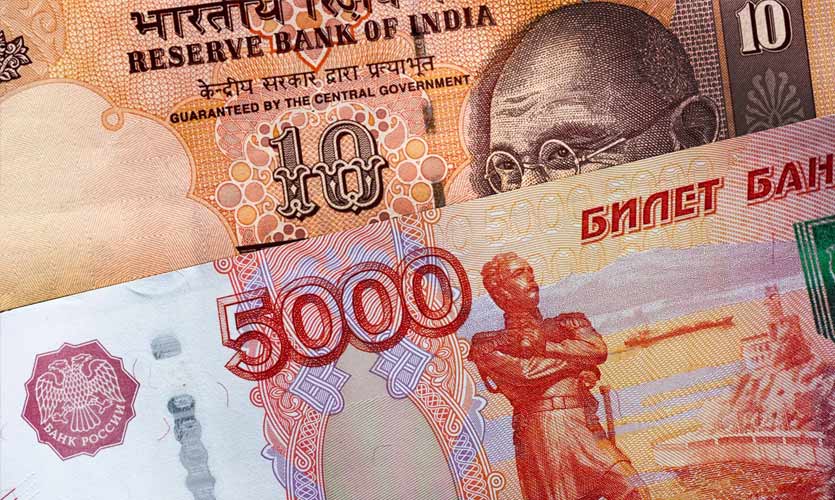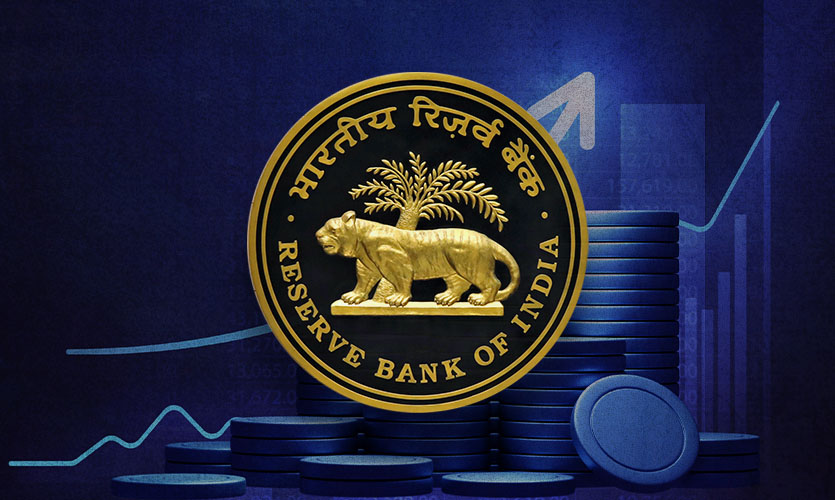India and Russia’s ongoing talks on setting up alternate payment methods for trade have taken a new direction. According to Bloomberg, the Russian government has proposed the use of a system developed by the Russian central bank for bilateral payments. Sources have confirmed that the Indian government is considering the proposal to continue the trade of oil and weapons with the sanctions-hit Russia. The system is a rupee-ruble-denominated payment method using Russia’s messaging system SPFS (System for Transfer of Financial Messages). There has been no confirmed decision on the matter yet, and discussions are expected to continue after Russian Foreign Minister Sergei Lavrov arrives in India for a two-day visit, on March 31.
The rupee-ruble payment mechanism will involve Indian exporters being paid in local currency for their export to Russia instead of the dollar or euro, the standard international currencies. To facilitate this payment, a Russian bank will need to open an account in an Indian bank and vice-versa. The two countries will then hold a fixed amount in local currencies in their respective accounts. The exchange value will then have to be agreed upon by the countries, which must have a notional value of equivalence, most likely in dollar or euro, to which the value of the Indian and Russian currencies will be pegged. Once set up, the countries can continue their trade deals despite the ongoing sanctions on Russia by the West. Undecided elements include whether the exchange rate will be fixed or floating.
According to a report by CNBC, A Sakthivel, president of the Federation of Indian Export Organisations (FIEO) said that the Indian government will permit four to five state-run banks to be engaged in the trade. Finance Minister Nirmala Sitharaman held consultations on the matter with Reserve Bank of India (RBI) Governor Shaktikanta Das and the banks. As per reports released last week, RBI officials met with officials from three Russian financial institutions namely VTB, Sberbank and Gazprombank. The Economic Times reported that the meeting was scheduled to discuss possible payment mechanisms, including the rupee-ruble trade. The RBI is currently looking to set up deeper engagement with Russian banks that have existing branches within India, to facilitate the trade. “If such an arrangement is approved, the need for an Indian bank playing a nodal role-as Uco Bank did for Indo-Iran trade (post US sanctions on Iran)-may not be needed. Funds would move between the respective local bank accounts of Indian firms doing trade with Russia and the Russian bank branches in India,” said a banker to the ET.
Members from the finance ministry were not available for comment on the new speculations, and an email contacting the RBI for comment wasn’t answered, as per the Bloomberg report.
India’s dependency on Russian weapons and the opportunity to buy cheaper oil during the ongoing surge in global oil prices is the reasoning behind the continued bilateral trade. The Indian government has cited China’s growing military assertiveness at the borders behind the arms purchase from Russia, and has pushed back against Western pressures. “Prima facie this is a bilateral agreement for payments against goods and services movement between two countries,” said Indranil Pan, the chief economist at Yes Bank Ltd, in Mumbai. He added, “Therefore, there shouldn’t be any risk imperative in this deal.” The report further suggested that Russia plans on asking India to link its Unified Payments Interface (UPI) with their MIR payments system for use of cards issued by Indian and Russian banks after Visa Inc and Mastercard Inc suspended operations amid the ongoing Russian invasion of Ukraine.
Read more: How Will The Russia-Ukraine Conflict Impact Indian Economy?
The news of the Russian foreign minister’s visit to Delhi on military and rupee-ruble talks has led to the U.S and Australia criticising India for considering Russia’s proposal. Accepting the proposal will undermine the sanctions imposed by the US and its allies. “Now is the time to stand on the right side of history, and to stand with the United States and dozens of other countries, standing up for freedom, democracy and sovereignty with the Ukrainian people, and not funding and fueling and aiding President Putin’s war,” Commerce Secretary Gina Raimondo told reporters in Washington, on March 30. She called reports of the arrangement “deeply disappointing”, while adding that she hadn’t seen details. Dan Tehan, Australia’s trade minister who also spoke at the briefing, said that it was important for democracies to work together “to keep the rules-based approach that we’ve had since the second world war”. India’s lack of outright condemnation of Moscow’s attack on Ukraine, and its plan to continue trade with Russia despite Western sanctions, has led to growing unhappiness with India among fellow members of the Quadrilateral Security Dialogue (Quad), a group of democracies seeking to counter China’s assertiveness in the Asia-Pacific region. The Quad comprises Australia, India, Japan, and the US.
The European Union and the US have cut off seven Russian banks from SWIFT, the Belgium-based cross-border payment system operator; these include state-controlled VTB, Bank Rossiya and Bank Otkritie. The rising sanctions and boycotts have led Russia to find alternative mechanisms to continue its trade hit by the conflict in Ukraine.










